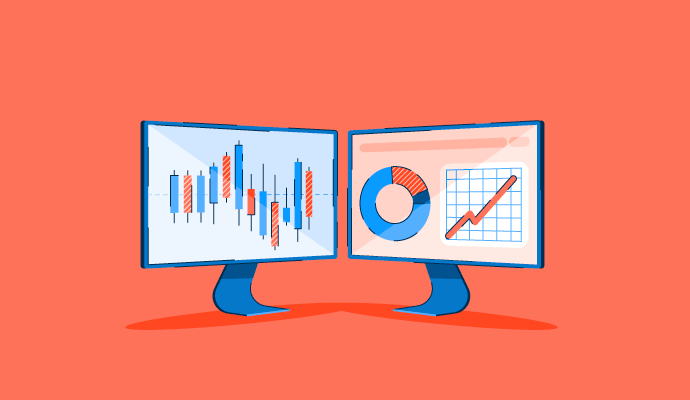What is a brokerage?
A brokerage account is a type of financial account that allows the owner to buy and sell stocks, bonds, mutual funds, and other types of investments.
Specialist brokerage trading platforms are typically used to monitor trading markets and help facilitate transactions. The owner may manage the brokerage themselves or have a financial institution acting on their behalf.
Money can be moved in and out of a brokerage account like a traditional bank account and is taxable when earnings have accrued. But unlike a regular bank account, these accounts have access to a wide range of investment opportunities.
Types of brokerage
While there are thousands of possible investment options, there are three main brokerage types. These are:
- Human brokers and advisors: A brokerage firm or financial advisor manages These accounts on the owner’s behalf. They can advise on the competitive landscape and offer other services such as insurance, estate planning, and tax support.
- Self-directed online accounts: Online e-trade accounts can be easily managed by the account owner. While there are greater risks for someone without experience, there’s also an opportunity for those who want a high level of involvement in their investments.
- Robo-advisors: Since 2010, algorithm-based robo-advisors have become popular. These accounts are self-managed but optimized based on preferences set by the owner. This is a good introduction to investing for new or young investors with small portfolios.
Types of investments held in a brokerage
Many types of investment can be held in a brokerage account. The most common are:
- Stocks: These investments give the owner a share of ownership in their chosen company. Also known as equities, stocks give the investor a select amount of the company’s assets and profits equal to the number of shares they own.
- Bonds: When a public company takes out a loan, they can sell off portions of their corporate debt as a tradable asset in the form of bonds. Owners can then receive income through the loan interest payments.
- Mutual funds: These are investments made in companies that pool money from a number of different investors and then reinvest that money into stocks or bonds of other companies. Investors can buy shares in the mutual fund and gain income from the wider portfolio.
- Exchange-traded funds (EFTs): Like a mutual fund, these investments are made into pools of a particular index. But investors are also able to sell and buy individual EFTs like regular stock, to curate a diverse selection or securities.
Benefits of brokerages
For those looking to invest, a brokerage is a useful way to manage a growing portfolio. Some of the benefits of a brokerage include:
- No contribution or income limits: With brokerages, there’s no limit to how many investments a portfolio contains. A brokerage account has no income restrictions, so anyone can open and manage one to fit their budget and lifestyle.
- More flexibility than other investments: Unlike other accounts like retirement savings, brokerages can be accessed anytime with no withdrawal penalties. This is particularly useful for funding short-term goals like a wedding, a new house, or a home remodel.
- Easier to manage: For those with a large number of investments, a single brokerage account makes managing those investments much simpler. One account means one statement with a consolidated view of the portfolio’s performance, making it easier to make decisions about buying and selling investment options.
Best practices for brokerages
When looking to open a brokerage account, it’s important to consider all available options and align these with financial goals. Some best practices to think about are:
- Deciding on brokerage type: Hands-on investors are generally best at managing their own accounts or using a robo-advisor to handle day-to-day trading, with a high level of personal management. Others may find a financial advisor more beneficial.
- Reviewing fees and minimum balance requirements: Many brokerages will manage a portfolio for a small fee, typically a percentage of the annual amount. Some are more than others, depending on the types of investments offered and the level of management. Comparing these and whether a minimum investment balance is required to open and retain the account is important before making a decision.
- Look at both long and short-term investments. The trading markets can be volatile. Big world events can cause significant disruptions to global economies, so any investments come with risks. By investing in both options with a range of payout options, investors can mitigate some of these risks and still grow their earnings.
- Review investments at least once a year. As many investments are taxable, it’s especially important to understand what may be owed during tax payments. For self-managed brokerages, reviewing what happens several times a year is critical. But even for those working with a brokerage firm or financial advisor, taking time to make decisions about investments is worthwhile.
Track and manage investment portfolios more effectively to provide better results for clients with investment management software.

Holly Landis
Holly Landis is a freelance writer for G2. She also specializes in being a digital marketing consultant, focusing in on-page SEO, copy, and content writing. She works with SMEs and creative businesses that want to be more intentional with their digital strategies and grow organically on channels they own. As a Brit now living in the USA, you'll usually find her drinking copious amounts of tea in her cherished Anne Boleyn mug while watching endless reruns of Parks and Rec.

